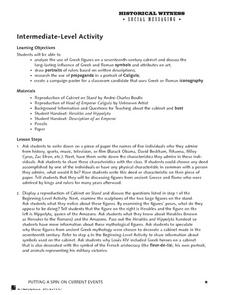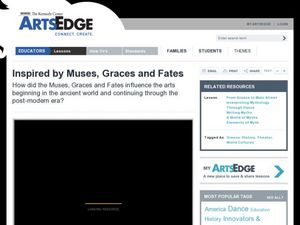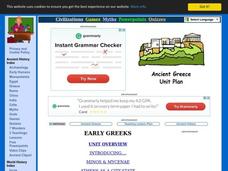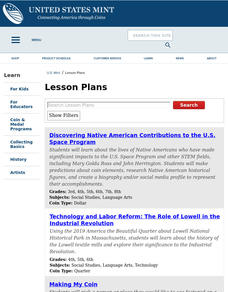Curated OER
Mythological Word Origins
Review myths and the characters therein, connecting them to vocabulary words in the English language today. Begin by searching online for myths and character names. With at least ten names that are familiar English words, students use...
Curated OER
Greek and Roman Symbolism
Students explore Greek and Roman symbolism in art. In this visual art lesson, students draw portraits of ancient leaders based on the written descriptions they read about them. Students also design campaign posters using Greek or Roman...
Curated OER
The History of Money
In this social studies worksheet, students investigate the history of paper money and coins. Students read paragraphs about what early people used for money and what kinds of banks were used. Students complete a crossword puzzle.
Curated OER
Inspired by Muses, Graces and Fates
Students examine how artists express the Muses through the arts. For this art and history lesson, students work cooperatively to identify the Greek Muses, Graces and the Fates. Students will identify the attributes of each, participate...
Curated OER
Heroes and Hoplites for a Day
Pupils consider the accomplishments of the Greeks. In this ancient Greece lesson, students take a closer look at Greek artifacts, history, and culture as they visit the suggested museums and their websites.
Curated OER
Ancient World
Sixth graders play a powerpoint jeopardy game. This can be used as a test or as a way to review information. This is a culminating test for our unit on Ancient Worlds. The jeopardy game is based on goals in math, language arts, and...
National Endowment for the Humanities
The Greek Alphabet: More Familiar Than You Think!
In this Greek alphabet lesson, pupils explore the Phoenician origins to the Greek alphabet. Learners compare Greek letters to current letters and write a paragraph about the life of learners in ancient Greece. They also identify...
Curated OER
What Is the History of the Consumption of Rice?
Sixth graders research the history of rice consumption. In this rice consumption lesson, 6th graders read a study guide and answer comprehension questions about two rice dishes and rice cultivation.
Curated OER
Sparta and Athens
Sixth graders study Ancient Greece. For this Ancient Greece lesson, 6th graders complete 16 lessons to learn about Ancient Greece. Students complete a quiz for assessment.
Curated OER
Comparing and Contrasting Ancient Civilizations
Students research the ancient civilizations of Rome, India, Greece, and Egypt. They conduct Internet research, compare/contrast aspects of each culture, and create a Powerpoint presentation.
Curated OER
Ancient Story Problems
Pupils research ancient civilizations, and develop story problems using symbols and coins from those times. They retell these story problems using modern terms and coins.
Curated OER
Greek and Roman Myths in Art-A Set of 7 Activities
Young scholars paricipate in seven activities to investigate ancient stories about heroes, monsters, gods, and goddesses.
Curated OER
The Greek Gods
What were the early Greek myths? Have elementary students examine the Persian Wars and read various Greek myth in order to identify the cause and the results of the Persian Wars. Myths, activities, simulations, and a unit plan are links...
Curated OER
Self-Portrait Shields
Students listen to the story, The Shield of Athena, and examine the original context of the sculptural fragment of a fallen warrior. They list important events and people in their lives, then create shields that depict their personal...
Curated OER
Breaking the Chains, Rising Out of Circumstances
Students research slavery in ancient Rome and compare and contrast it to slavery in the United States. In this slavery lesson, students investigate the differences of slavery in different parts of the country, write a paper to...
Curated OER
An Ancient Greek and Roman Festival
Third graders label a map of ancient Greek and Roman civilizations and do a written report on one element of these two cultures. They participate in discussions of food, farming, daily life and government (among others). Students use the...
Curated OER
The Great Lighthouse at Alexandria
Students read and research about Alexandria's Great Lighthouse. In this Greek architecture lesson plan, students create a timeline of events in Alexandria, and design a lighthouse. Students research lighthouses online and write a report.
Curated OER
The Warrior Role in Greek Society
Students are introduced to the various gods and goddesses in ancient Greek mythology. In groups, they use print and electronic resources to research the ways Greek culture has influenced the modern world. To end the lesson, they...
Museum of Tolerance
The Role of Citizens in a Participatory Democracy
Groups research participatory democracies and compare the role and rights of citizens in ancient history with those in recent U.S. history. Guided by a series of questions, individuals compose a persuasive essay in which they discuss the...
J. Paul Getty Trust
O Greek Shape! O Fair Pose!
Everything old is new again. The Los Angeles J. Paul Getty Museum presents a activity on how Greek black-figure painting influenced eighteenth century Neoclassical artists. After looking at a series of examples, class members create...
Curated OER
Symposia: Scholarly Parties
Students hold a symposium during which students debate the benefits of democracy in ancient Greece and the United States. By doing this, students explain the role of symposia in ancient Greek culture and politics.
Curated OER
Go For The Gold!
Third graders read fiction and nonfiction works for comprehension. Using the internet, 3rd graders participate in a WebQuest. They compare and contrast the Olympics in ancient Greece to the modern day Olympics. Afterwards, students...
Curated OER
Midsummer Night's Dream Unit
High schoolers use the Internet to research one of Shakespeare's plays. They read two myths and create their own script for the play. They also examine the history of Ancient Greece.
Curated OER
Ancient Myths Retold
Students are introduced to mythology and create modern versions of ancient myths based on figures represented on modern U.S. coins.

























